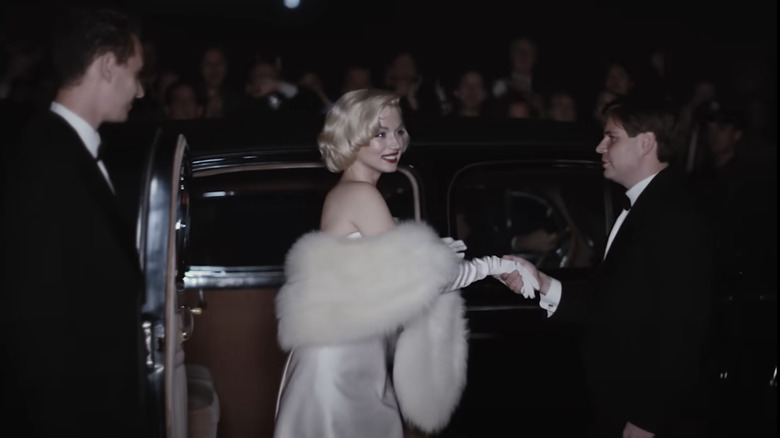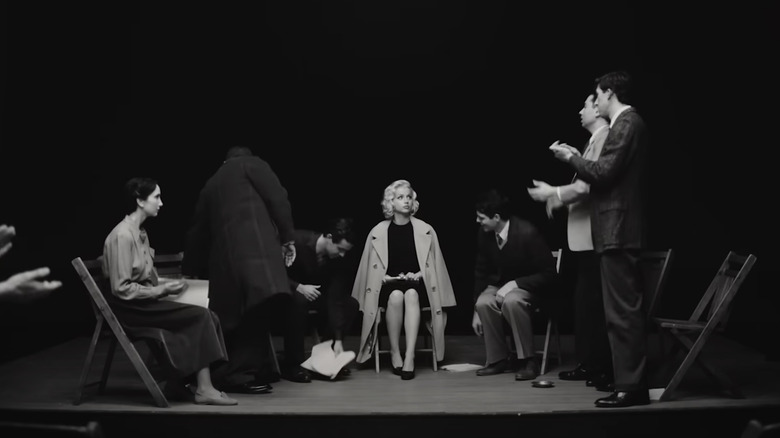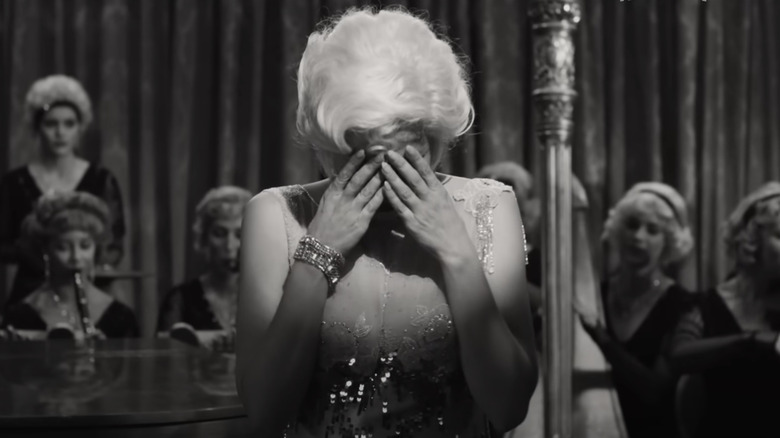How Ana De Armas Ensured She Wasn't Just Doing An Impression Of Marilyn Monroe In Blonde
Ana de Armas' latest role left her with some massive shoes to fill. While playing any character comes with unique quirks and difficulties, there's just something about playing Marilyn Monroe — a troubled actress, born Norma Jean Baker, whose charming reputation endured for six decades after her death — that seems more intimidating. Monroe was known for her sultry elegance, captivating voice, and dazzling allure, but simultaneously, she was a persona that Baker had created. Replicating Monroe's individual traits would be difficult enough; combining them all into an homage to both her and Baker would be all the more difficult.
Then there's the issue of background. Monroe's accent was a distinct part of her persona, whereas de Armas was born in Cuba and learned English as a second language. As many Agatha Christie adaptations (and the recent "Knives Out" sequel) have taught us, it's hard to mimic an accent that isn't your own — and without a consistent handle on pronunciation, it's easy for an on-screen project to feel a little off. Becoming Monroe would be no easy feat, but de Armas was up for the challenge.
The voice was crucial
As she began to recreate Marilyn Monroe and Norma Jean Baker alike, de Armas found herself focusing on the late actress' voice. But she didn't want to simply mimic it — instead, de Armas saw a well-developed, emotionally nuanced voice as a sign that she had cracked into a faithful rendition of the "Some Like it Hot" star. As she told Variety:
"Someone's voice has many qualities. It's not just an accent or the pitch or the breathiness. You can imitate someone very well and have no soul. As much as I wanted to get it as close as possible to her voice, if that voice didn't have a feeling, that meant nothing to me."
Even just from the trailer of "Blonde," it's clear that de Armas nailed the feeling. Her accent pokes out and adds another layer to the voice, but Monroe's signature sultriness is unmistakable. The final product didn't come easily, though: de Armas spent two hours on voice lessons each day, often after long hours on the "Knives Out" set. Monroe's own accent shifted over the years too, providing an additional challenge for de Armas.
Finding common ground
It's difficult to ever truly capture someone's essence, but the "feeling" behind de Armas' rendition of Marilyn Monroe's voice was likely influenced by the younger actress' own experiences. In an interview, Stephen Colbert asked de Armas if Baker's story resonated with her as "a young actress on a rapid upward trajectory ... [and] someone who is beautiful but needs to be taken seriously as an artist." Not only did de Armas agree, but she also noted that she was surprised by just how much she had in common with the star.
Unfortunately though, as much as I'd love to praise both actresses and call it a day (they're both extremely talented, for one), many of their similarities are far from positive. Monroe was a sex symbol in a deeply objectifying era, and while we've made considerable strides since then, de Armas is already bracing for the sex scenes in "Blonde" to be treated just as crassly. Likewise, both women had a hard time getting on screen, whether that was for a small breakout role or a major biopic. But they do have something inspiring in common, too: their trailblazer status. While Monroe shattered barriers and advocated for better contracts, de Armas is hopeful that "Blonde" will show casting can be even more diverse. Both might be tall orders, but if there's anything that Monroe taught Hollywood, it's not to underestimate a strong woman.


